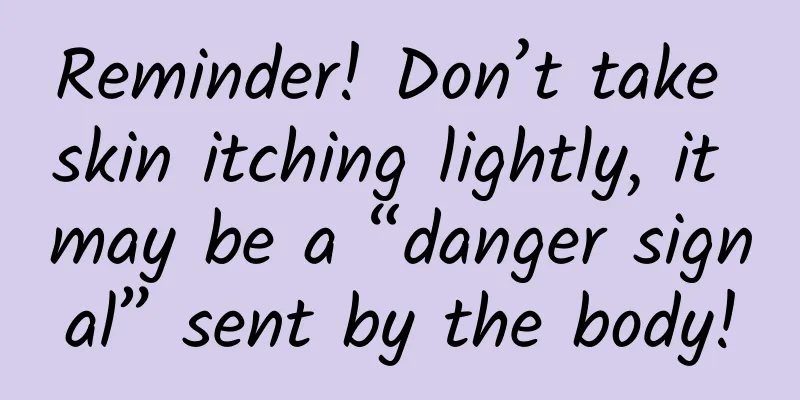Variable "allergies"

|
This is the 4948th article of Da Yi Xiao Hu In the hospital emergency room, you can see patients coming to the hospital for various "allergic" reactions, such as those who develop rashes after taking medications, redness, itching and dizziness after eating seafood, shock after being bitten by insects, and sneezing and wheezing after inhaling pollen. In real life, allergies are always an unavoidable topic. "Allergy" means excessive sensitivity. When the human body comes into contact with certain foreign substances, it will cause the human immune system to produce some specific antibodies. These antibodies mistake originally harmless substances for harmful things, causing the body to overreact. Because allergies have various causes and manifestations, it is sometimes difficult to judge when they come and go. It is quite confusing. Let's talk about this changeable "allergy" here. 1. There are many different allergens Allergens are a necessary condition for the occurrence of allergies. There are 2,000 to 3,000 common antigens that cause allergic reactions, and medical literature records nearly 20,000 of them. The most effective measure to treat stubborn allergies is to find out the allergy-inducing factors (allergens), but it is difficult to accurately find the causative factors among so many inducing factors. Based on the way the human body comes into contact with the allergens, we introduce the common allergens in real life as follows: 1. Inhaled allergens Such as pollen, catkins, dust, animal dander, etc. 2. Ingestion allergens Such as seafood (especially shellfish), fish and shrimp, fruits, mushrooms, beef and mutton, some medicines, etc., but sometimes it is not the food itself that causes allergies, but the additives in the food (such as disinfectants, preservatives, etc.). 3. Contact allergens Such as cold air, hot air, ultraviolet rays, cosmetics, shampoo, hair dye, detergent, mites, etc. 4. Injectable allergens Such as penicillin, streptomycin, xenogeneic serum, etc. 5. Self-tissue antigens Mental stress, fatigue, work pressure, microbial infection, etc. 2. Clinical manifestations are diverse May manifest in the respiratory tract Such as asthma, chest tightness, nasal congestion, runny nose, etc.; skin: such as rash, erythema, itching, etc.; digestive tract: such as nausea, vomiting, diarrhea, stomach heat, colic, bloating, etc.; microcirculation and central nervous system: such as pale complexion, irritability, weak pulse, decreased blood pressure, loss of consciousness, etc. 3. Diverse Disease Types Such as allergic asthma, allergic rhinitis, allergic conjunctivitis, urticaria, drug allergy, food allergy, solar dermatitis, allergic gastroenteritis, etc. Although allergies vary in many aspects and different allergens manifest themselves differently in the human body, their occurrence mechanisms are the same. They all have sensitization stage, excitation stage, and effect stage. See the figure below for details. 4. What are the anti-allergic drug treatments? 1. Antihistamines For example, second-generation antihistamines such as cetirizine hydrochloride and loratadine can prevent histamine from binding to corresponding receptors and exert an anti-allergic effect. 2. Allergic reaction media release inhibitor For example, ketotifen is a strong allergic mediator inhibitor, suitable for the prevention and treatment of various types of bronchial asthma, and can also be used to treat allergic rhinitis and allergic dermatitis. 3. Immune regulation For example, vitamin C can help the human body eliminate free radicals and protect human tissue cells from destruction and damage by free radicals. When the human body comes into contact with allergens, vitamin C can play its antihistamine effect. 4. Special drug treatment Drugs such as glucocorticoids, calcium gluconate, epinephrine, etc. are mostly used for severe allergic reactions or anaphylactic shock caused by penicillin, and are used in hospitals. 5. How to prevent allergies? 1. Stay away from allergens. 2. Pay attention to your daily life, proper diet and appropriate physical exercise. 3. Improve the body's immune ability. 4. There are reports that traditional Chinese medicine, honey, cold water nasal washing, and diet therapy (such as white radish and carrot) can be used to prevent and treat pollen allergies. Author: Shanghai Fifth People's Hospital Affiliated to Fudan University Zhang Xuemin Chief Doctor |
<<: Do you know what aromatherapy is?
>>: How Much Do You Know About the Dragon Boat Festival Materia Medica
Recommend
What kind of women have strong sexual function
In life, there are always some women who have par...
What causes abdominal pain in late pregnancy?
Many women are very cautious throughout their pre...
Why does a woman's fart stink?
In some public occasions, if you fart accidentall...
What is the reason for irregular menstruation in girls
We all know that menstruation is an important phy...
Can nipples be bleached?
Generally speaking, people's nipples are pink...
Do you know these blood donation knowledge?
You should donate blood while you are still young...
Does a woman's body temperature rise during menstruation?
Women's body temperature will change througho...
Can I go hiking during menstruation?
Many women will still participate in some sports ...
What is the reason for brown vaginal discharge before menstruation?
Women's reproductive health has begun to rece...
Lower body pain in late pregnancy
In the later stages of pregnancy, if you experien...
I suddenly became infertile and vomited. What happened?
We all know that women will experience symptoms o...
Symptoms of threatened abortion abdominal pain
In modern society, pregnancy problems are becomin...
How many days is the lottery redemption period during the epidemic? What should I do if the lottery redemption period expires during the epidemic?
We all know that lottery is a popular form of gam...
Causes of belly button pain during pregnancy
After many of our female compatriots become pregn...









